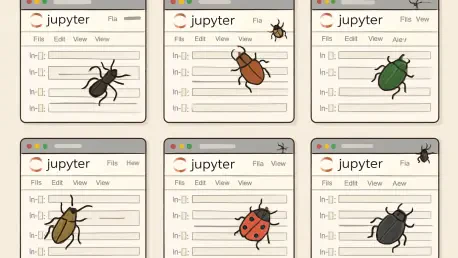In a world where data drives decisions in healthcare, finance, and technology, a startling reality emerges: the very tool millions of data scientists rely on might be riddling their work with errors, threatening the integrity of critical research. Jupyter Notebook, an open-source platform hailed for its interactive prowess, powers countless research projects with its ability to blend code, visualizations, and text. Yet, beneath this celebrated interface, bugs and vulnerabilities threaten to skew results and compromise security. Could these hidden flaws be silently eroding trust in a cornerstone of modern data science?
The Silent Threat in a Data Science Giant
At the heart of data-driven innovation lies Jupyter Notebook, a tool that has become synonymous with flexibility and ease in research. Its capacity to allow real-time code edits and dynamic data exploration has made it indispensable for professionals and academics alike. However, recent studies reveal a troubling underbelly—bugs that can distort findings or expose sensitive data to risks like ransomware. This tension between usability and reliability raises a critical question about the platform’s role in high-stakes environments.
The significance of this issue cannot be overstated. With billions invested in data science across industries—Canada alone channeling between $29 and $40 billion into the field by recent estimates—the integrity of tools like Jupyter is paramount. Errors in research can ripple outward, affecting everything from medical breakthroughs to financial forecasts. Addressing these flaws is not merely a technical concern but a necessity for safeguarding the credibility of data-driven decisions.
Digging Deeper into Jupyter’s Vulnerabilities
A comprehensive study from the University of Alberta, spearheaded by Assistant Professor Thibaud Lutellier, analyzed nearly 9,000 Jupyter Notebooks from platforms such as GitHub and Kaggle. The findings pinpoint critical weaknesses, including misconfigurations often caused by users unfamiliar with the platform’s intricacies. These errors can lead to data loss or inaccurate interpretations, undermining the very purpose of scientific inquiry.
Another alarming discovery centers on security lapses. Vulnerabilities in Jupyter expose users to severe threats, particularly in fields where data confidentiality is non-negotiable. Beyond mere inconvenience, these gaps could invite malicious attacks, disrupting entire research ecosystems. The study’s insights suggest that the platform’s design, while innovative, often lacks the robustness needed for error-free operation in complex scenarios.
Collaboration: A Double-Edged Sword
Surprisingly, the research highlights collaboration as a significant contributor to bugs in Jupyter Notebook. Projects involving multiple contributors show a higher incidence of errors, a finding that caught even the study team off guard. Undergraduate researcher Harsh Darji notes, “The more collaborators there are, the more likely it is that bugs will be introduced.” This statistic paints a stark picture of teamwork’s unintended consequences in interactive coding environments.
The root of this issue lies in miscommunication and inconsistent updates among team members. Without clear protocols, changes to shared notebooks can introduce defects that go unnoticed until they cause major setbacks. This challenge underscores a gap in how Jupyter supports group dynamics, revealing a need for better tools to manage collaborative efforts without sacrificing code integrity.
Expert Insights on the Growing Concern
Assistant Professor Thibaud Lutellier captures the essence of the problem, stating, “It’s a lot easier to accidentally break something in the code or set up the system incorrectly.” His observation reflects the inherent risks of Jupyter’s dynamic design, where frequent modifications heighten the chance of mistakes. This expert perspective emphasizes the delicate balance between the platform’s accessibility and the precision required in data science.
Beyond academic analysis, real-world anecdotes from users on platforms like Kaggle echo these concerns. Many report frustration when collaborative projects spiral into chaos due to undetected errors, often stalling progress at critical junctures. Such experiences highlight a pressing demand within the community for solutions that can reconcile ease of use with the stringent demands of reliable research outcomes.
Strategies to Combat Jupyter’s Flaws
Tackling these vulnerabilities demands actionable measures from both users and developers of Jupyter Notebook. Data scientists are encouraged to adopt strict version control practices and invest time in mastering proper configurations through available resources like tutorials. These steps can significantly reduce the risk of errors stemming from misuse or oversight in individual and team settings.
For collaborative groups, establishing defined workflows is essential. Assigning specific roles for code management and conducting regular reviews can catch discrepancies before they escalate. Meanwhile, developers are urged to innovate with tools like AI-driven bug detection systems, a focus of Lutellier’s current research. Such advancements could provide real-time alerts, helping to fortify Jupyter against common pitfalls.
Looking back, the journey to uncover and address bugs in Jupyter Notebook revealed a complex interplay of innovation and risk. Reflecting on the efforts of researchers and users alike, it became clear that the path forward hinged on collective action. Strengthening this vital tool required not just technical fixes but a cultural shift toward meticulous practices and robust support systems. The data science community stood ready to implement enhanced workflows, integrate cutting-edge detection tools, and prioritize education, ensuring that Jupyter evolved into a bastion of reliability for future discoveries.









